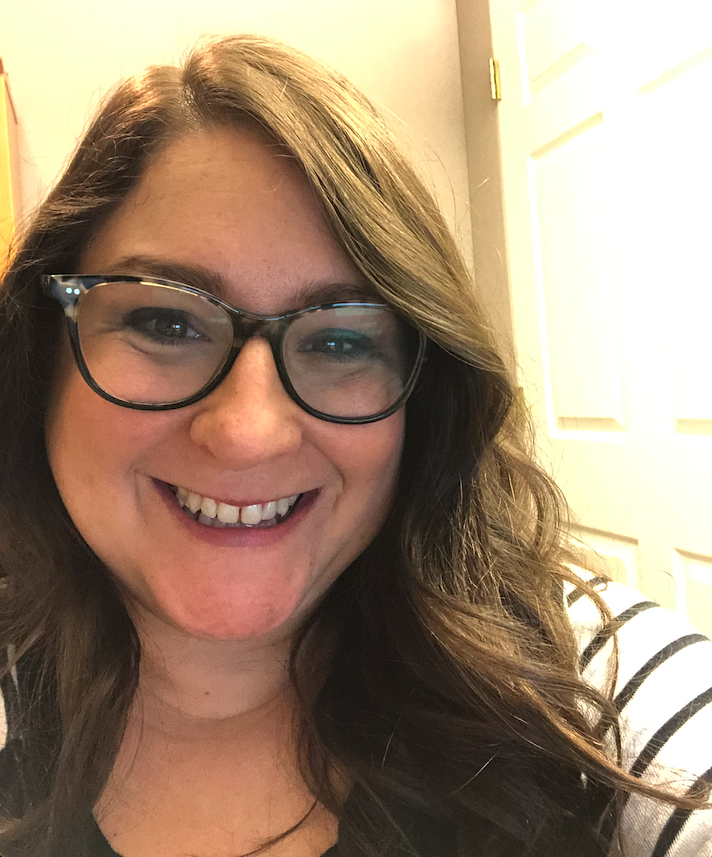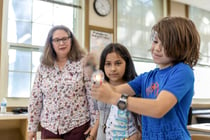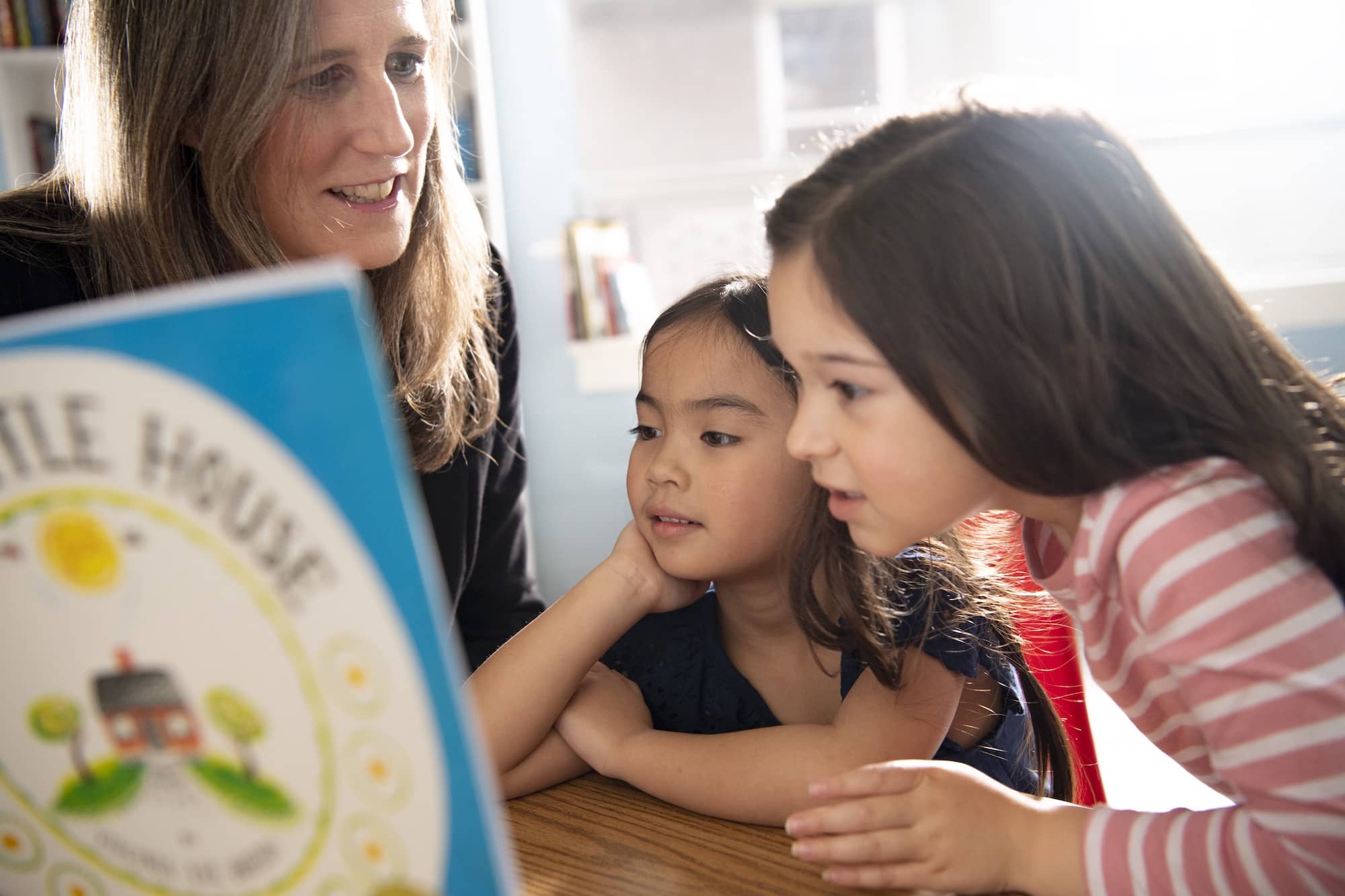Posted in: Aha! Blog > Wit & Wisdom Blog > Preparation > The Coach We All Need: How Great Coaches Support Teacher Preparation
This month, we asked educators across the country to reflect on their preparation for Wit & Wisdom® instruction. Mandy Polen, an Instructional Coach for Mad River Local Schools in Ohio and a professional development facilitator for Great Minds®, shares lessons learned about coaching through her experiences during the pandemic as a Grade 3 teacher.
The 2020–2021 school year looked very different in schools everywhere. For the past four years, my role has been supporting the implementation of Wit & Wisdom® and Geodes® as an instructional coach. While I modeled and co-taught lessons with teachers, I had never taught Wit & Wisdom in my classroom to my students. In response to the pandemic, my work shifted from coaching to teaching. For the first time ever, I was teaching in a virtual Grade 3 English Language Arts classroom. Teaching 47 third grade students remotely made for both the most challenging and most rewarding year of my professional career.
The opportunity to step back into the shoes of fellow teachers has made me a better coach. Writing this blog is a way for me to share what has been an unexpected and unique journey. I want to offer three key pieces of advice for coaches or other instructional leaders.
While I am proud of my ability to listen to and advocate for the teachers I serve, I had forgotten how difficult it is to be an excellent teacher. Teachers carry an exhausting mental load—decisions, grading, report cards, and constant worry about students. Coaches must honor teachers by remembering how much everyone expects of them every single day. As a coach, I used to geek out over my favorite edu-celebrities. Attending live professional development sessions or webinars, listening to podcasts, and reading research excited me. However, being thrust back into the classroom, my cognitive load was spent on a very different set of tasks: teaching 8-year-olds via Zoom, worrying about students who were not engaging, remembering to submit attendance, responding to parent emails, and planning lessons. I was caught up in the day-to-day survival, and I longed for a coach to listen to and help me process the struggles of teaching remotely. I needed someone to help me recognize and celebrate my students’ successes and be my cheerleader in moments of frustration.
Planning for instruction consumed most of my mental load. I often say, “Preparation is more than just lesson planning.” Lesson planning involves logistical tasks, like adjusting slide presentations and setting up digital options for students to respond or turn in assignments. Preparing to teach is deeper than planning a lesson; it requires internalizing lesson and module goals. During preparation, I invested time in the Module Study and Focusing Question Arc protocols. At the lesson level, I planned for what students would do, why those activities mattered, and how to engage the students in a remote setting. I felt very fortunate to have a curriculum that provides students with engaging topics and tasks; I just needed to figure out how to make the content accessible to my students in a remote learning environment. I worked to make informed, strategic decisions that did not take away from each module’s learning goals—knowing the why allowed me to uphold the rigor while providing scaffolds when and where my students needed them. I knew when to allow students to struggle productively and when to resist the urge to rescue students from difficult work. As a coach, it is my job to empower teachers to make these same instructional decisions. Stepping back into teaching reinforced my commitment to challenge teachers to uphold the rigor of lessons by reminding them that students learn best in that sweet spot of productive struggle.
It’s difficult to clearly define the coach’s role or measure their impact on students and teachers. Last spring, when I stepped back into my coaching role, I observed a colleague’s coaching conversation with a teacher. Through her questions, this coach helped the teacher see some of the unintended consequences of drastically changing a lesson. This observation reminded me of the powerful effect of coaching conversations. Making a simple observation, starting with, “I noticed you. . .” and then following up with a question like, “Why did you make that decision?” is a powerful framework for feedback. Coaches must have a deep understanding of the curriculum design to have meaningful coaching conversations and ask the right questions. Always keeping in mind the mental load teachers carry and how challenging it can be for them to see the big picture gives me the confidence to ask these hard questions. It is my responsibility to help teachers reflect on their decisions. Coaching conversations work best when there is trust and when teachers feel safe and supported by their coach. In the past, I struggled to offer advice or to remind teachers of what research tells us, but I now know that we all need someone who can help us improve our craft.
I am excited to begin this new school year as a full-time instructional coach again. I hope to be the coach that I longed for during my brief time back in the classroom. My year of teaching validated some of my previous work as a coach. I am walking back into coaching with a new, clearer vision of my role. A coach respects, honors, and encourages teachers to dig into a curriculum and then digs in alongside. Coaches listen, ask good questions, and support teachers with helpful reflection while encouraging growth. All teachers deserve to have a great coach. A good coach is a gift to teachers.
Submit the Form to Print

Mandy Polen
Mandy Polen has worked for Mad River Local Schools in Riverside, Ohio for 22 years, where she has worked as a 3rd, 4th, and 5th grade classroom teacher and an instructional coach. She has worked for Great Minds as a Wit & Wisdom PD Implementation Support Specialist for the past 3 summers. Mandy was a Knowledge on the Go 1st Grade Teacher and team member and was a part of the Geodes First User Forum.
Topics: Preparation










